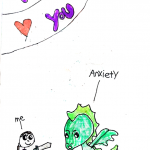Does your Child’s Fear of Needles Have you Worried about the Vaccine or other Medical Appointments?

Do you have concerns about your child’s fear of needles?
As a parent, helping your child overcome his or her fear of needles can seem impossible and stressful for both you and your child. Recent announcements allowing 5 to 11 year olds access to the Covid-19 vaccine, along with annual flu season shots might have you asking how you can ensure your child’s health and safety without getting into a wrestling match.
Although many children have mild fears related to needles, for some children this fear can be so overwhelming it leads to them crying, screaming, or worse! As a parent you might feel at a loss about how to handle the situation. Maybe you have tried bribery (who wants to go to the toy store?), or maybe you have found yourself dishing out “tough love”. Either way you might be left feeling like nothing works.
At its core the fear of needles is a form of anxiety, and the approach is similar to the approach for other types of anxiety – exposure and preparation. You can use these two steps to work together with your child to face the fear, and then celebrate the brave steps your child has taken.
Exposure
Exposure might be different for each child. For young children you might expose them to the idea of needles by playing together with a child’s doctor kit. You can let them pretend to be the doctor or the patient and let them get used to seeing the needle and being around it. For older children you might read a storybook where the child gets a needle. This allows them to face their fear in a smaller and safer way, you can think of it as a “baby step”.
Preparation
Allowing your child to be part of the plan can be very powerful. You can talk with your child about what will happen, and what to expect. Let them make choices amongst the options available. For example, maybe they can choose between sitting on your lap or sitting on the chair, or maybe they can choose which clinic you attend. You can also prepare the coping plan. They can choose a toy to bring as a distraction, a video to watch on your phone, or you can practice deep breathing with them. You can present them with a few different choices and let them decide which coping strategies they want to use.
Face the Fear and Celebrate
Finally, the day will arrive when your child will face the fear. You can support your child in using his or her coping plan. After the needle is all done it is time to celebrate the accomplishment! Even if your child still cried or reacted negatively, you will want to point out that they were successful in getting their needle and that they were brave to face their fear. This will reinforce in their mind how brave they can be even if they felt afraid, and that next time it might feel a tiny bit easier.
Want to read more about this subject? Please take a look at these resources from Anxiety Canada. If you need some professional help in putting together a coping plan, feel free to reach out to us at Dragonfly. As parents to young children ourselves we understand the struggle of an anxious child around needles.
Good luck to everyone this flu season!


